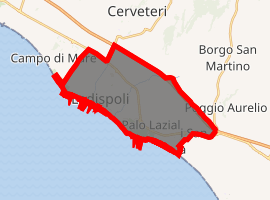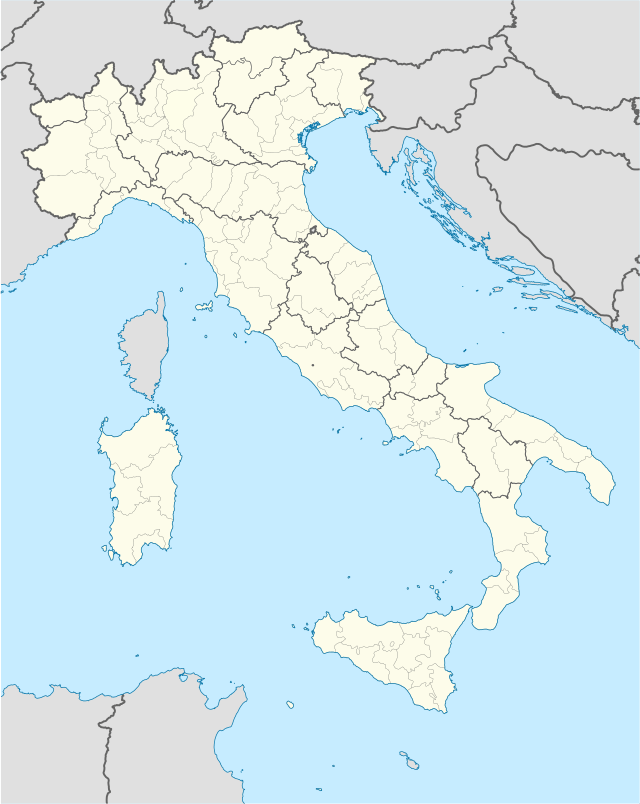Ladispoli
Ladispoli is a town and comune in the Metropolitan City of Rome, Lazio, central Italy. It lies about 35 kilometres (22 mi) west of center of Rome, on the Mediterranean Sea.
Ladispoli | |
|---|---|
| Comune di Ladispoli | |
Housing in Ladispoli | |
 Coat of arms | |
Location of Ladispoli 
| |
 Ladispoli Location of Ladispoli in Italy  Ladispoli Ladispoli (Lazio) | |
| Coordinates: 41°57′N 12°05′E | |
| Country | Italy |
| Region | Lazio |
| Metropolitan city | Rome (RM) |
| Frazioni | Marina di San Nicola, Monteroni |
| Government | |
| • Mayor | Alessandro Grando (FdI) |
| Area | |
| • Total | 25 km2 (10 sq mi) |
| Elevation | 2 m (7 ft) |
| Population (31 August 2015)[2] | |
| • Total | 41,084 |
| • Density | 1,600/km2 (4,300/sq mi) |
| Demonym(s) | Ladispolensi or Ladispolani |
| Time zone | UTC+1 (CET) |
| • Summer (DST) | UTC+2 (CEST) |
| Postal code | 00055 |
| Dialing code | 06 |
| Patron saint | St. Davide Orazi, St. Andrea Mele, St. Guglielmo Ponzi |
| Saint day | March 18 |
| Website | Official website |
History
Modern Ladispoli occupies the area of the ancient Alsium, the port of the Etruscan city of Cerveteri and later a Roman colony cited by Cicero.
Alsium was destroyed in the 6th century AD, during the Gothic War, by the Ostrogoths led by Totila. Later a castle, named Palo, was built in the area: it was a fief of the Orsini and, from 1693, of the Odescalchi family.
Modern Ladispoli was founded in 1888 by Ladislao Odescalchi, from whom it takes its name.
In the late 1970s and until the early 1990s, parts of Ladispoli served as refugee camps for Soviet emigrants seeking political and/or religious asylum in Western countries (mostly United States, Canada and Australia). The experience of Jews from the former USSR staying in Ladispoli in the 1980s was first described in English by Maxim D. Shrayer in his literary memoir "Waiting for America" (2007).[3]
Main sights
- The Etruscan necropolis of Monteroni and Vaccina.
- The Roman Villa of Pompey.
- The Castle of Palo (1132 AD, rebuilt in the 16th century).
- The Castellaccio, a fortified country residence.
- The Giardino delle Orchidee Spontanee del Mediterraneo, a botanical garden
Demography
According to ISTAT figures dated 31 December 2010 there were 7711 foreign nationals living in Ladispoli. The nationalities most represented according to their percentage of the total population were:
- from Romania - 4620 (11.26%)
- from Poland - 826 (2.01%)
Notable people
- Andrea Zitolo, scientist
- Roberto Rossellini, film director
Twin cities







.svg.png)
References
- "Superficie di Comuni Province e Regioni italiane al 9 ottobre 2011". Istat. Retrieved 16 March 2019.
- "Popolazione Residente al 1° Gennaio 2018". Istat. Retrieved 16 March 2019.
- ,
External links
- Official website (in Italian, English, French, Spanish, and German)
- Airport Transfers from and to Rome